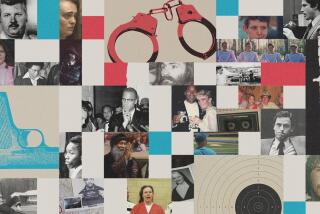Landmark civil rights documentary ‘Eyes on the Prize’ returns to TV
Nearly 30 years after it first aired on PBS and at a time when race relations once again dominate the national conversation, the landmark series “Eyes on the Prize” is returning to television.
The 14-part documentary, which chronicled three decades of the civil rights movement, will air starting Sunday night on public television’s World Channel. It will be preceded by an all-new half-hour special, “Eyes on the Prize: Then and Now,” tying the series to the present-day movements such as Black Lives Matter.
Created by pioneering filmmaker Henry Hampton and narrated by the late Julian Bond, “Eyes on the Prize” dramatized the civil rights movement using news footage, photographs and interviews with key participants.
SIGN UP for the free Classic Hollywood newsletter >>
The first six episodes covered the decade that began with the murder of Emmett Till and culminated with the triumphant passage of the Civil Rights Act in 1965. Broadcast on PBS in 1987, the series earned widespread acclaim, including six Emmy Awards and an Academy Award nomination.
Released in 1990, Part 2 of the series chronicled the assasination of Martin Luther King Jr., the rise of the Black Power movement, conflicts over school desegration in Boston, and the election of Harold Washington as the first African American mayor of Chicago in 1983.
Instead of relying on journalists, historians and other analysts to interpret the movement, “Eyes the Prize” featured only people who’d taken part in the events being recounted -- the men and women who’d marched, sat in at lunch counters and registered voters across the South, as well as those who’d stridently opposed them.
Filmed at a time when many key figures of the era were still alive, the series includes appearances by activists such as Coretta Scott King and Kwame Touré (Stokely Carmichael), as well as segretationists like George Wallace, lending it an immediacy that remains striking even 30 years after it was made.
“Any filmmaker who wants to tell a historical story and a social justice story has to look at ‘Eyes on the Prize’ to see how to do it right,” said Chris Hastings, executive producer of World Channel.
Although it is considered one of the most important accounts of the civil rights movement, and unlike Ken Burns’ “The Civil War,” which has been rebroadcast numerous times since its debut in 1989, “Eyes on the Prize” was for many years absent from television and not available to purchase on DVD because of the prohibitive cost of licensing archival footage, music and photographs.
For a time, the series became the focus of a mini-movement of its own, with copyright reformers organizing screenings and illegally sharing downloads of “Eyes on the Prize” online.
Part I finally came out on DVD in 2010, but Part 2 is still not commercially available, making its broadcast all the more noteworthy.
“It’s been a gift to re-air it and have the stories available, because stories are what motivate people,” said Judi Hampton, sister of Henry Hampton, who died in 1998. “I think Henry’s smiling somewhere.”
Follow @MeredithBlake on Twitter.
More to Read
The complete guide to home viewing
Get Screen Gab for everything about the TV shows and streaming movies everyone’s talking about.
You may occasionally receive promotional content from the Los Angeles Times.






